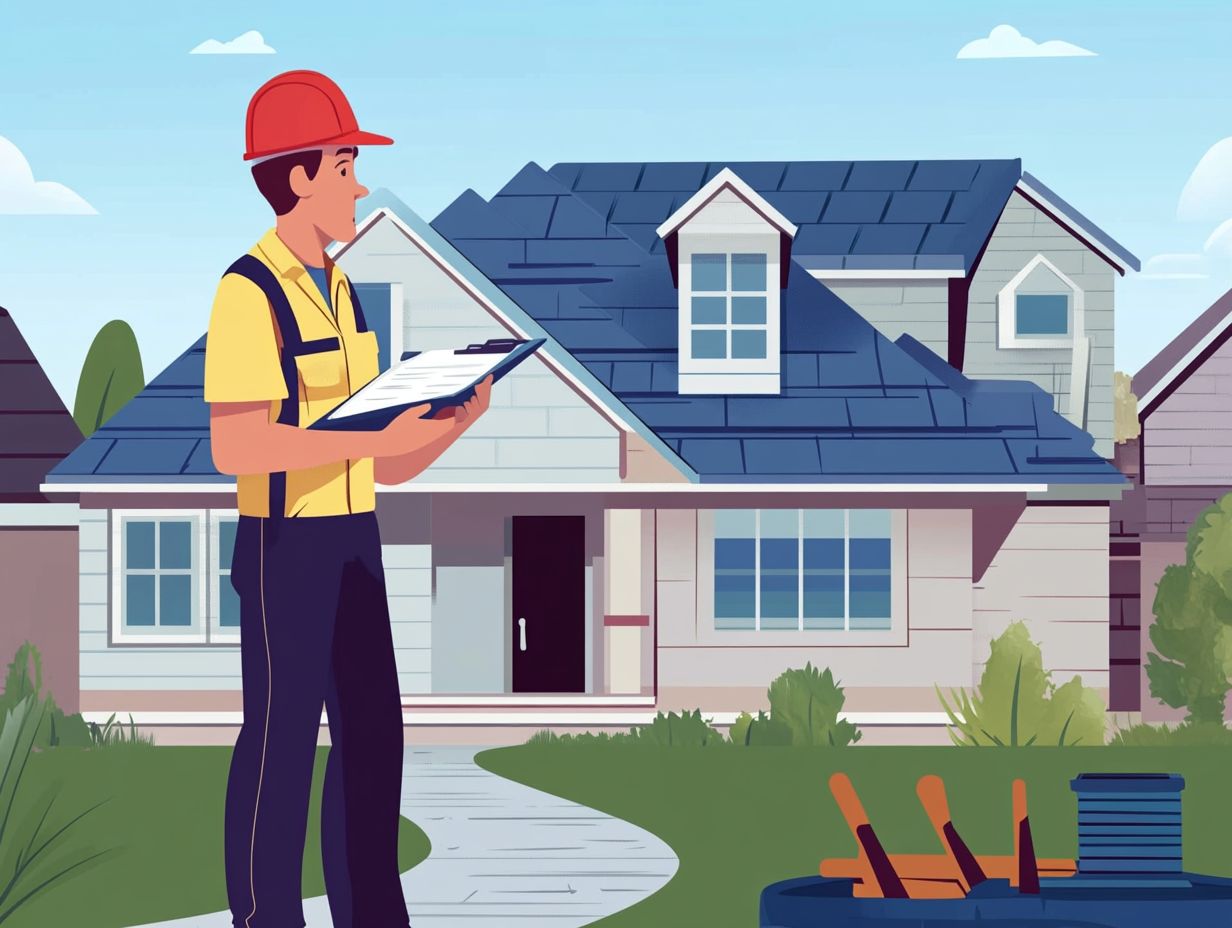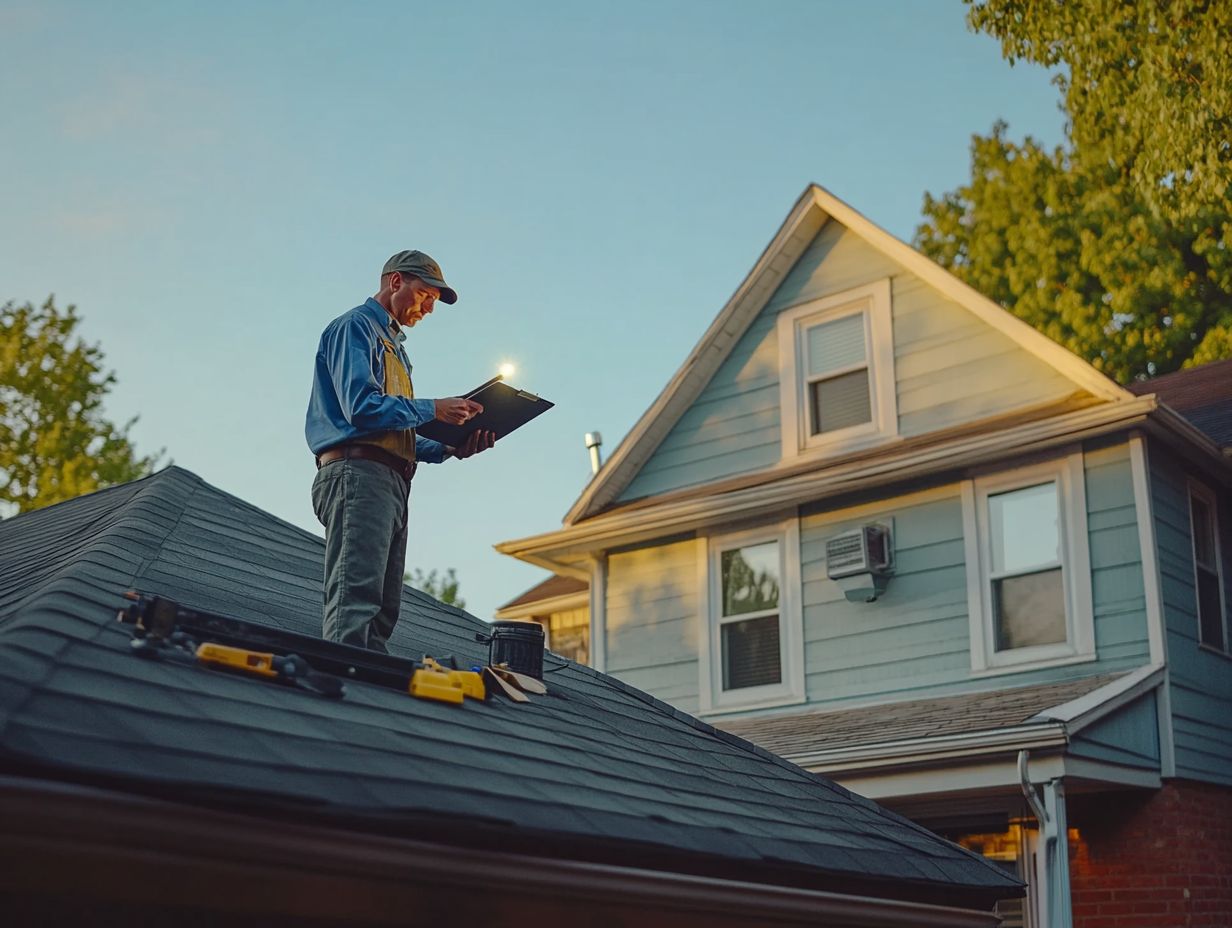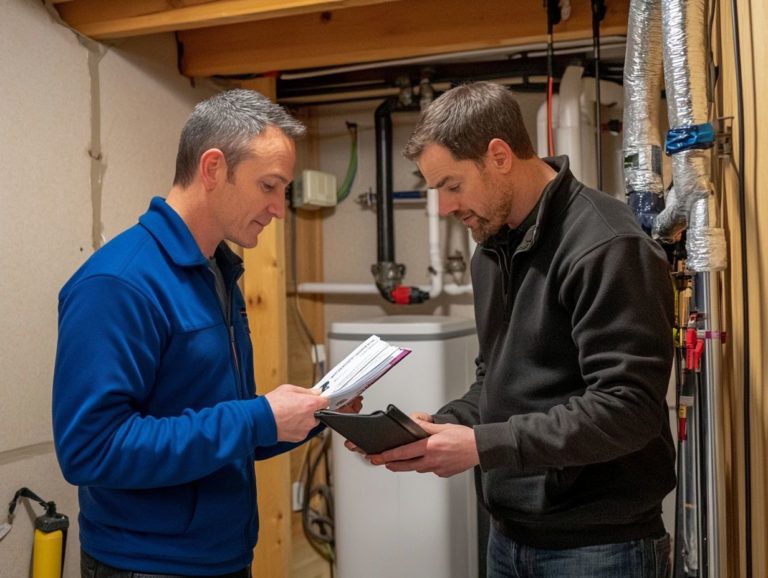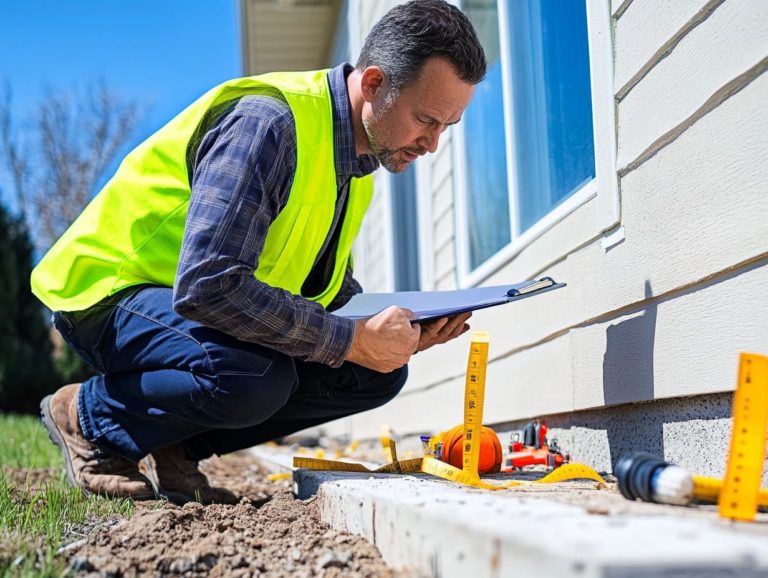The Importance of Home Inspections for Buyers
Buying a home is one of life s biggest investments. It’s vital to understand a property’s condition before committing.
Home inspections are key in this process. They provide insights into the property’s state and reveal hidden issues that might affect your decision.
This article will explain what a home inspection involves and how to choose the right inspector for your needs.
Learn how these evaluations empower you as a buyer, giving you peace of mind and negotiation power.
Contents
- Key Takeaways:
- Understanding Home Inspections
- What Home Inspections Cover
- Benefits of Home Inspections for Buyers
- Choosing a Home Inspector
- Preparing for a Home Inspection
- Interpreting Home Inspection Reports
- Addressing Issues Found in a Home Inspection
- Frequently Asked Questions
- What is the importance of home inspections for buyers?
- What does a home inspection entail?
- Why is it important for buyers to attend the home inspection?
- Can a home inspection help buyers negotiate a better price?
- Are there any potential red flags to look out for during a home inspection?
- What happens if a home inspection reveals major issues?
Key Takeaways:

Home inspections provide a detailed understanding of a property’s condition. They help you make informed choices about your investment.
By uncovering potential problems, home inspections give you leverage to negotiate repairs or a lower price.
Select a qualified home inspector and prepare for the process to get the most out of your inspection.
Understanding Home Inspections
Understanding home inspections is a vital part of your home buying journey. This process reveals both visible and hidden issues that may pose safety risks, highlighting the importance of pre-purchase home inspections.
A comprehensive inspection can uncover crucial details about structural integrity, HVAC systems, and potential mold or pest issues. These findings can significantly impact your decisions in the competitive real estate market.
What is a Home Inspection?
A home inspection is a thorough evaluation of a property’s condition. It focuses on various systems to uncover hidden issues and safety risks.
This appraisal covers key components of the home s essential systems, ensuring you know what lies beneath the surface.
Typically, the assessment includes:
- HVAC systems (heating, ventilation, and air conditioning)
- Plumbing lines
- Electrical wiring
- Roof integrity
- Foundation stability
Inspectors look for water damage, mold, and pest infestations while checking the functionality and safety of appliances. This knowledge helps you make informed decisions about necessary repairs.
Why Are They Important for Buyers?
Home inspections are critical for buyers, as they highlight the importance of home inspections in identifying potential safety risks and hidden issues that could lead to costly repairs later.
Use these inspections to negotiate repairs or price reductions with sellers. By revealing problems that may go unnoticed, you can avoid unexpected expenses after closing.
These inspections are powerful tools in negotiations with sellers. Understanding the importance of home inspections can also affect your homeowner insurance, as providers often assess a home’s state before issuing policies.
Ensuring the property meets standards helps secure coverage and may lead to lower premiums, offering you significant long-term benefits.
What Home Inspections Cover
Home inspections provide a thorough evaluation of key areas and systems within a property. Expect detailed assessments of foundational integrity, HVAC systems, and common defects that may affect safety and functionality.
Areas and Systems Inspected
During a home inspection, key areas and systems like heating, ventilation, and air conditioning (HVAC), plumbing, electrical, and foundation are thoroughly evaluated for safety and functionality.
The inspector examines each component, starting with the HVAC system to ensure it operates efficiently for both heating and cooling. They also look for signs of wear that could lead to costly repairs and energy inefficiency down the line.
Plumbing systems are checked for leaks, clogs, and the overall condition of pipes. Overlooking these issues could lead to severe water damage or even mold growth.
Electrical systems must meet safety standards. Inspectors check for outdated wiring, adequate grounding, and potential fire hazards.
Foundation issues can indicate structural weaknesses that might compromise the home’s integrity, leading to significant financial implications for you as a future homeowner.
Each of these evaluations plays a vital role in establishing the overall safety and marketability of a property.
Benefits of Home Inspections for Buyers

The advantages of home inspections for you as a buyer are considerable. They uncover potential issues within a property and greatly strengthen your negotiating power regarding repair costs and the final purchase price, highlighting the importance of home inspections for property buyers.
Identifying Potential Issues
Home inspections are essential for uncovering potential issues that might not be immediately visible, such as safety hazards or hidden problems in the property that could lead to significant repair costs.
During these evaluations, inspectors frequently find common problems like mold hiding in damp corners, which can pose serious health risks if not addressed promptly. You might also discover foundation issues, revealing cracks or settling that could jeopardize the home s stability.
Another concern that often arises is termite infestations, which can silently damage wooden structures over time.
By recognizing these issues early, you can confidently protect your investment!
Negotiating Power
An inspection report equips you with essential insights that can be strategically utilized to negotiate repairs or price reductions. Understanding the importance of home inspections for real estate transactions protects you from unforeseen repair expenses after your home purchase is finalized.
This document is a vital asset during negotiations, allowing you to present concrete findings to sellers persuasively. Highlight issues such as roofing problems, plumbing issues, or outdated wiring, and lay the groundwork for constructive discussions.
Sellers are often more open to negotiation when presented with documented evidence. This thoughtful approach encourages transparent dialogue and helps set realistic expectations.
Ultimately, effectively leveraging the inspection report can greatly impact the transaction, steering both parties toward a mutually satisfying resolution.
Choosing a Home Inspector
Selecting a qualified home inspector is an essential step in your home buying journey.
The inspector’s qualifications and experience significantly impact the quality and reliability of the inspection process, ensuring you make a well-informed decision about your potential investment.
Qualifications and Experience
When selecting a home inspector, be mindful of their qualifications. Look for certifications from respected organizations like ASHI or InterNACHI, along with their hands-on experience in the field. These credentials not only reflect professionalism but also assure you that the inspector is well-versed in current industry standards and practices.
Inquiring about their specific areas of expertise can also be advantageous for instance, their understanding of local building codes or familiarity with particular types of homes. Experience is paramount; a seasoned inspector is far more likely to spot potential issues that a novice might miss.
Seek out inspectors who deliver comprehensive reports and have a solid reputation. This indicates their dedication to thoroughness and customer satisfaction throughout the inspection process.
Start your search for a qualified home inspector today to make the most informed decision possible!
Questions to Ask
Asking the right questions can shape your inspection process. It ensures you receive a report tailored to your needs as a home buyer.
Consider these key inquiries to select a knowledgeable inspector:
- First, ask about their qualifications and experience. Understanding their training gives you peace of mind.
- Inquire about the specific areas they will evaluate like the roof, plumbing, and electrical systems. This helps gauge their assessment skills.
- Know how quickly they deliver the report. This allows you to plan your next steps in the buying process.
- Ask if they are familiar with any unique local issues. Local knowledge can uncover potential red flags.
Preparing for a Home Inspection

Preparing for a home inspection is crucial. It helps you know what to expect and how to organize your property effectively.
This preparation streamlines the inspection process and may influence your insurance options.
What to Expect and How to Prepare
During a home inspection, expect a thorough examination of the property. Inspectors will focus on safety issues and structural integrity.
Familiarize yourself with common red flags. Look for signs like uneven floors or water stains.
Prepare a list of questions about safety and property assessments. Discuss these with the inspector.
On inspection day, attend if possible. Observing provides valuable insights into your potential investment.
This experience will deepen your appreciation for maintenance and safety practices.
Interpreting Home Inspection Reports
Interpreting inspection reports is an essential skill for home buyers. Understanding these findings helps evaluate repair costs and make informed decisions, highlighting the importance of home inspections in real estate deals.
Understanding the Results
Understanding inspection report results is vital. They reveal hidden issues affecting the property s value and safety.
By analyzing the findings, you can identify potential problems like electrical deficiencies or plumbing leaks that may lead to costly repairs.
For example, a compromised roof may need immediate replacement and could lead to water damage. This situation might require further negotiations.
These factors guide your investment evaluation, balancing maintenance costs with the property’s appeal.
Addressing Issues Found in a Home Inspection
Addressing issues from a home inspection is essential. It requires a thoughtful approach to negotiate repairs or price reductions based on the inspection insights.
Negotiating Repairs or Price Reductions
Negotiating repairs or price reductions after a home inspection can greatly influence your overall cost of homeownership. This process allows you to address serious issues highlighted in the inspection report before finalizing the purchase.
By carefully looking at the inspection findings, you can spot areas needing immediate attention, such as roof leaks, electrical hazards, or plumbing inefficiencies. With this information, you can have a productive conversation with the sellers, clearly and respectfully presenting your concerns.
Stay flexible! This can help you work better with the seller while emphasizing crucial repairs. Your willingness to cooperate can build goodwill and increase the chances of reaching an agreement that benefits both parties.
Using industry standards and repair estimates from trusted contractors can serve as strong evidence to support your requests. This can ultimately help you secure necessary concessions or commitments to address repairs.
Frequently Asked Questions

What is the importance of home inspections for buyers?
Home inspections are essential for buyers as they provide a detailed assessment of the property’s condition. Understanding the importance of a home inspection for buyers helps them make informed decisions about their purchase.
What does a home inspection entail?
A home inspection typically includes a thorough examination of the property’s structural components, major systems, and potential safety hazards. This may involve reviewing the roof, foundation, heating and cooling systems, plumbing, electrical systems, and more.
Why is it important for buyers to attend the home inspection?
Attending the home inspection allows buyers to see any issues or concerns pointed out by the inspector. It also gives them the chance to ask questions and better understand the property’s condition, highlighting the importance of home inspections for new homeowners.
Can a home inspection help buyers negotiate a better price?
Yes! A home inspection report can serve as a bargaining tool to negotiate a lower price. If significant issues arise during the inspection, buyers can ask the seller to either make necessary repairs or reduce the price to cover repair costs.
Are there any potential red flags to look out for during a home inspection?
Some common red flags during a home inspection include mold, structural damage, faulty electrical or plumbing systems, and outdated or unsafe appliances. These issues can be expensive and may impact the buyer’s decision to purchase the property.
What happens if a home inspection reveals major issues?
If a home inspection reveals major issues, buyers have several options. They can request the seller make necessary repairs, negotiate a lower price to account for repair costs, or choose to walk away from the purchase altogether.






